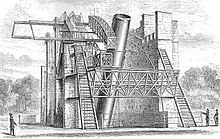Leviathan of Parsonstown

Victorian picture of the "Leviathan of Parsonstown"
|
|
| Location(s) |
Birr Castle |
|---|---|
| Named after |
Leviathan |
| Coordinates | 53°05′42″N 7°55′12″W / 53.095°N 7.92°WCoordinates: 53°05′42″N 7°55′12″W / 53.095°N 7.92°W |
| Weather | 60 nights per year |
| Built | 1842–1845 |
| First light | 15 February 1845 |
| Telescope style |
reflecting telescope, Newtonian telescope |
| Diameter | 1.8 m (5 ft 11 in) |
| Focal length | 16 m (52 ft) |
| Mounting | meridian/alt-az hybrid |
| Website | birrcastle |
|
|
|
|
[]
|
|
Leviathan of Parsonstown is the unofficial name of the Rosse six-foot telescope. This is a historic reflecting telescope of 72 in (1.8 m) aperture, which was the largest telescope in the world from 1845 until the construction of the 100-inch (2.5 m) Hooker Telescope in 1917. The Rosse six-foot telescope was built by William Parsons, 3rd Earl of Rosse on his estate, Birr Castle, at Parsonstown (now Birr in County Offaly, Ireland).
Parsons improved the techniques of casting, grinding and polishing large telescope mirrors from speculum metal, and constructed steam-powered grinding machines for parabolic mirrors. His 3 ft (90 cm) mirror of 1839 was cast in smaller pieces, fitted together before grinding and polishing; its 1840 successor was cast in a single piece. In 1842, Parsons cast his first 6 ft (1.8 m) mirror, but it took another five casts, before he had two ground and polished mirrors. Speculum mirrors tarnished rapidly; with two mirrors, one could be used in the telescope while the other was being re-polished. The telescope tube and supporting structure were completed in 1845.
The mirror was 5 in (13 cm) thick and weighed almost 3 tons. This required a mirror cell to support and to prevent the mirror deforming under its own weight. The length of the tube and mirror box is about 54 ft (16.5 m); including the mirror it weighed about 12 tons. The tube is supported at the mirror end by a "universal joint", a hinge with two axes, which allows the tube to be inclined through a large range of altitude and also to be turned through a limited range of azimuth. The azimuth range is limited to about one hour by the supporting walls that flank the tube on its eastern and western sides. The walls are 23 ft (7 m) apart, 40 ft (12 m) high, and 71 ft (21.5 m) long. A chain and counterweight keeps the telescope in balance, another chain with a winch controls the altitude. A rack and pinion beam underneath the tube controls the azimuth. This beam is connected to the eastern supporting wall, where it can move on a circular iron arc to allow the telescope to change altitude.
...
Wikipedia
